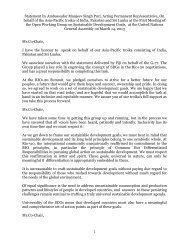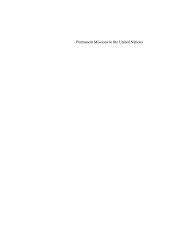STATE OF THE WORLD'S CITIES 2012/2013 Prosperity
STATE OF THE WORLD'S CITIES 2012/2013 Prosperity
STATE OF THE WORLD'S CITIES 2012/2013 Prosperity
Create successful ePaper yourself
Turn your PDF publications into a flip-book with our unique Google optimized e-Paper software.
Foreword<br />
This is a time of crises. This<br />
is also a time for solutions.<br />
Indeed, the world is<br />
currently engulfed in waves<br />
of financial, economic,<br />
environmental, social and<br />
political crises. Amidst<br />
the turmoil, however, we<br />
are also witnessing valiant<br />
and creative attempts at<br />
different levels and by different actors to seek for solutions.<br />
The State of the World’s Cities Report <strong>2012</strong> presents,<br />
with compelling evidence, some of the underlying factors<br />
behind these crises that have strongly impacted on cities.<br />
It shows that a lopsided focus on purely financial prosperity<br />
has led to growing inequalities between rich and poor,<br />
generated serious distortions in the form and functionality<br />
of cities, also causing serious damage to the environment –<br />
not to mention the unleashing of precarious financial<br />
systems that could not be sustained in the long run.<br />
The Report proposes a fresh approach to prosperity,<br />
one that is holistic and integrated and which is essential for<br />
the promotion of a collective well-being and fulfilment of<br />
all. This new approach does not only respond to the crises<br />
by providing safeguards against new risks, but it also helps<br />
cities to steer the world towards economically, socially,<br />
politically and environmentally prosperous urban futures.<br />
In order to measure present and future progress of cities<br />
towards the prosperity path, the Report introduces a new<br />
tool – the City <strong>Prosperity</strong> Index – together with a conceptual<br />
matrix, the Wheel of <strong>Prosperity</strong>, both of which are meant to<br />
assist decision makers to design clear policy interventions.<br />
To varying degrees of intensity, cities have been hit by<br />
different crises. However, this Report tells us that cities can<br />
also be a remedy to the regional and global crises. When<br />
supported by different tiers of government, and in the quest<br />
to generate holistic prosperity, cities can become flexible<br />
and creative platforms to address these crises in a pragmatic<br />
and efficient manner. <strong>Prosperity</strong>, in this sense, can be<br />
seen as a Pharmakon – both a cause of the problem and a<br />
remedy. As per this ancient Greek construct, when used<br />
properly, it can help decision-makers to steer cities towards<br />
well-balanced and harmonious development.<br />
iv<br />
In this Report, UN-Habitat advocates for a new type of<br />
city – the city of the 21st century – that is a ‘good’, peoplecentred<br />
city, one that is capable of integrating the tangible<br />
and more intangible aspects of prosperity, and in the process<br />
shedding off the inefficient, unsustainable forms and<br />
functionalities of the city of the previous century. By doing<br />
this, UN-Habitat plays a pivotal role in ensuring that urban<br />
planning, legal, regulatory and institutional frameworks<br />
become an instrument of prosperity and well-being.<br />
This is a time of solutions to the numerous challenges<br />
that confront today’s cities. If we are to take measures that<br />
will make a difference to the lives of the billions of people in<br />
the world’s cities, and to future generations, we need sound<br />
and solid knowledge and information. This Report provides<br />
some of these crucial ingredients. I am confident that it will<br />
serve as a useful tool in the necessary redefinition of the<br />
urban policy agenda at local, national and regional levels.<br />
I do believe also that it will provide valuable insights in the<br />
search for urban prosperity and related policy changes in<br />
the years ahead.<br />
The Report is a bridge between research and policy,<br />
with inputs from more than 50 cities, individual scientists<br />
and institutions, particularly the Directorate-General for<br />
Regional Policy from the European Commission, and other<br />
partner institutions around the world that participated<br />
actively in the preparation of this study. I would like to thank<br />
them for their immense contribution. I would also like to<br />
thank the Government of Norway for its financial support.<br />
The partnerships that have evolved during the<br />
preparation of this report are part and parcel of, as well as<br />
critically essential in, creating the building blocks of a more<br />
sustainable prosperity, one that is shared by all. UN-Habitat<br />
is determined to sustain and consolidate such partnerships<br />
as we collectively chart a better future.<br />
Joan Clos<br />
Under-Secretary-General,<br />
United Nations Executive Director, UN-Habitat



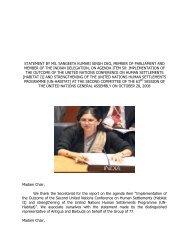
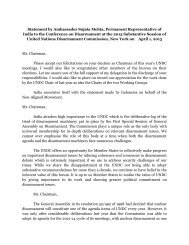
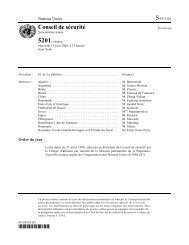
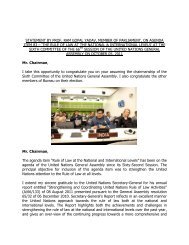
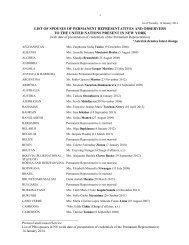
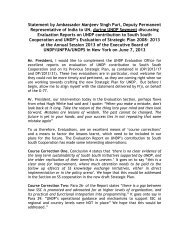
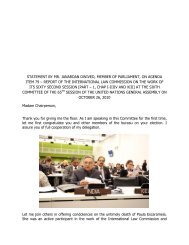
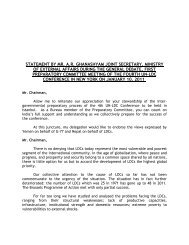
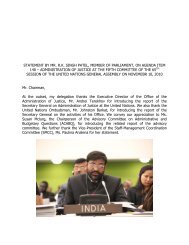
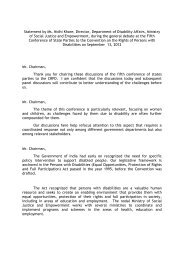
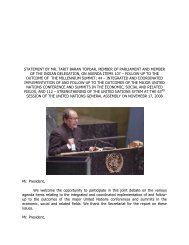
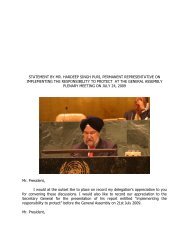
![1 statement by dr.[mrs] kakoli ghosh dastidar - Member States Portal](https://img.yumpu.com/27526598/1/190x245/1-statement-by-drmrs-kakoli-ghosh-dastidar-member-states-portal.jpg?quality=85)
